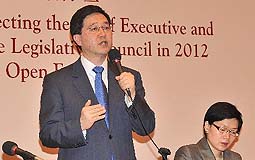 |
| Strength in unity: LegCo members and the Hong Kong Government both have a constitutional duty and responsibility to work together to address the issue of constitutional development in 2012, Stephen Lam says. |
|
|
Secretary for Constitutional & Mainland Affairs Stephen Lam says the Government considers two political parties' pending resignations from five geographical constituencies to be unnecessary.
The two parties in the Legislative Council consider their move to be de facto referendum on universal suffrage. But, Mr Lam pointed out, "The Basic Law does not provide any mechanism for conducting a referendum."
He added: "If we wish to make amendments to the electoral methods for the Chief Executive and for the LegCo, we must go through a five-step constitutional procedure. It is necessary for both the Government and the legislature to comply with the Basic Law and the relevant interpretations and decisions made by the Standing Committee of the National People's Congress."
LegCo members and the Hong Kong Government both have a constitutional duty and responsibility to work together to address the issue of constitutional development in 2012, he stressed.
Mr Lam was speaking after attending a Government forum to listen to public views on the consultation document on the methods for selecting the Chief Executive and for forming the Legislative Council in 2012.
"Today, during this open forum, we have received different sorts of views regarding constitutional development. There are citizens who support that we have complied with the decision taken by the Standing Committee of the National People's Congress to implement universal suffrage for the Chief Executive in 2017 and for the LegCo in 2020. There are those who still wish to seek the implementation of universal suffrage in 2012," he said, adding the Hong Kong Government welcomes views from all sides.
Extensive discussions
After publishing a green paper on constitutional development in 2007, the Government initiated extensive community discussions on the universal suffrage timetable, electoral methods and roadmap. The Chief Executive submitted a report to Beijing for the National People's Congress Standing Committee's consideration, that faithfully reflected opinions expressed by the community at that time, Mr Lam noted.
"In opinion polls which we collected from universities and other think tanks, more than half of the public supported the implementation of universal suffrage by 2012. The Chief Executive also made clear in his report that the Central Authorities should take seriously and give consideration to these views. At the same time, about 60% of the public, according to opinion polls, would accept the implementation of universal suffrage for returning the Chief Executive first in 2017 if this could not be attained in 2012.
"We understand as a government that these two political parties would wish to resign and would take a different view on the models for implementing universal suffrage elections. However, as far as we are concerned, we believe that different political parties and LegCo members can certainly support that we should have progress in 2012 for the two electoral methods and thereafter continue to address and to secure the support for the ideal universal suffrage models which they believe would merit their support."
Go To Top
|



